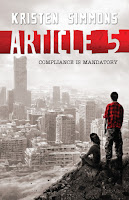Recently, Nathan Bransford had a great post on writers/authors and casual, ranting reviews. The subjects covered were how an author should react to a ranting review and whether writers/authors give up the right to write casual or ranting reviews.
This topic is near and dear to me because I write negative reviews. Even though I try very hard to keep it constructive, I have been 'questioned' by a handful of authors. It's a highly unpleasant experience. One way to avoid it would be to only write positive reviews, but I just can't bring myself to do that. It would feel...false. I am a writer, and writers are not average readers. Not anymore. We know too much about craft and what goes on behind a story to ever be 'just a reader' again. Since I want to write the best stories I possibly can, that means exploring other books to learn how effective certain aspects of stories can be (or not be). It would feel selfish of me to not share my findings.
So, when an author challenges me about my review, it never comes off well and makes me less likely to read his future books . There is one author in particular whose subsequent book has sounded very interesting and even been recommended to me, but each time I try to pick it up, I am reminded of the earlier, unpleasant interaction and the book feels tainted by association. It's completely not fair to the book (or me, for that matter), but I can't look at it objectively anymore. Which means this: I'm not reading this author, reviewing this person's books, or recommending him/her to other people. That right there should be reason enough to not to respond to any reviews, especially the less than favorable ones. And certainly not in a public forum. Even a simple 'thank you' to a positive review can bring a valuable or interesting discussion to a screeching halt.
As for writers and authors writing casual or ranting reviews, well, this is what I think. When you aspire to be an author (or if you are one), you enter a realm of professionalism where ranting reviews just don't belong. I've come across some writers' websites that shred the books they hate and gush about the ones they love. I get the need to rant. I really do. Books are designed to elicit emotional responses from the reader, and some are more negative than others. But a public review isn't the place to rant. It makes you look petty and unprofessional, and trying to get your work published is hard enough without all that.
So, I guess I am basically saying that I agree with Nathan. Casual, ranting reviews have no place in the professional world of publishing, nor does responding to a review of your book.
This topic is near and dear to me because I write negative reviews. Even though I try very hard to keep it constructive, I have been 'questioned' by a handful of authors. It's a highly unpleasant experience. One way to avoid it would be to only write positive reviews, but I just can't bring myself to do that. It would feel...false. I am a writer, and writers are not average readers. Not anymore. We know too much about craft and what goes on behind a story to ever be 'just a reader' again. Since I want to write the best stories I possibly can, that means exploring other books to learn how effective certain aspects of stories can be (or not be). It would feel selfish of me to not share my findings.
So, when an author challenges me about my review, it never comes off well and makes me less likely to read his future books . There is one author in particular whose subsequent book has sounded very interesting and even been recommended to me, but each time I try to pick it up, I am reminded of the earlier, unpleasant interaction and the book feels tainted by association. It's completely not fair to the book (or me, for that matter), but I can't look at it objectively anymore. Which means this: I'm not reading this author, reviewing this person's books, or recommending him/her to other people. That right there should be reason enough to not to respond to any reviews, especially the less than favorable ones. And certainly not in a public forum. Even a simple 'thank you' to a positive review can bring a valuable or interesting discussion to a screeching halt.
As for writers and authors writing casual or ranting reviews, well, this is what I think. When you aspire to be an author (or if you are one), you enter a realm of professionalism where ranting reviews just don't belong. I've come across some writers' websites that shred the books they hate and gush about the ones they love. I get the need to rant. I really do. Books are designed to elicit emotional responses from the reader, and some are more negative than others. But a public review isn't the place to rant. It makes you look petty and unprofessional, and trying to get your work published is hard enough without all that.
So, I guess I am basically saying that I agree with Nathan. Casual, ranting reviews have no place in the professional world of publishing, nor does responding to a review of your book.



